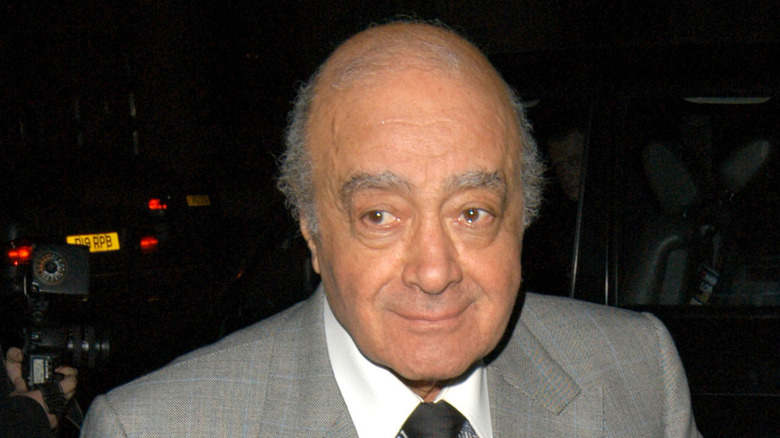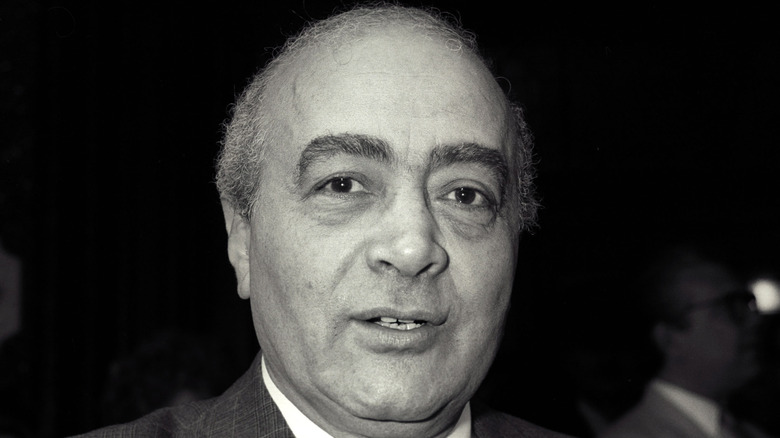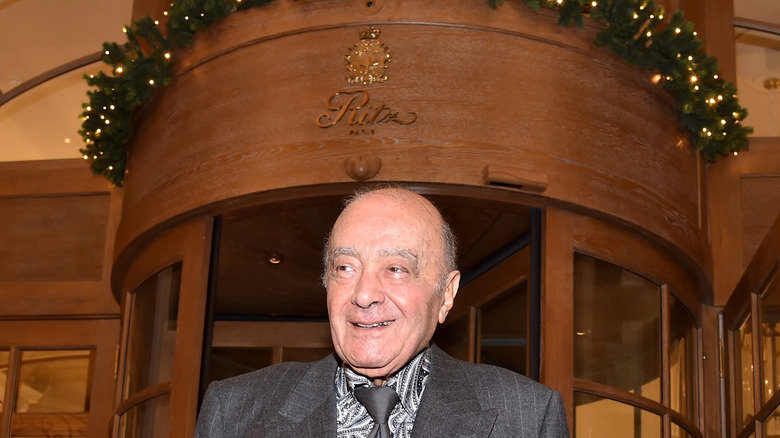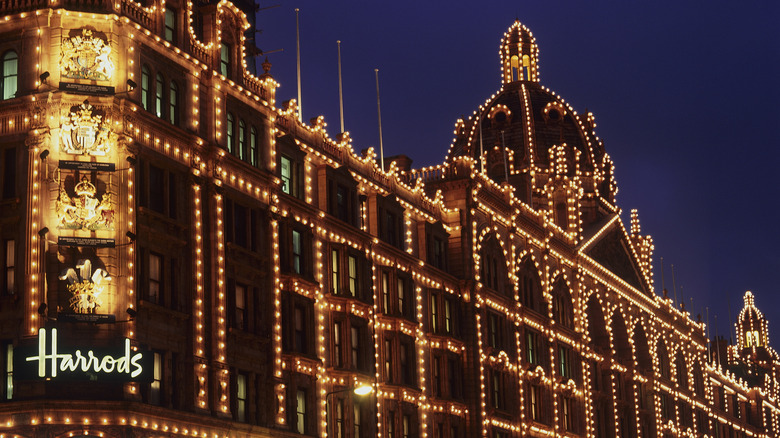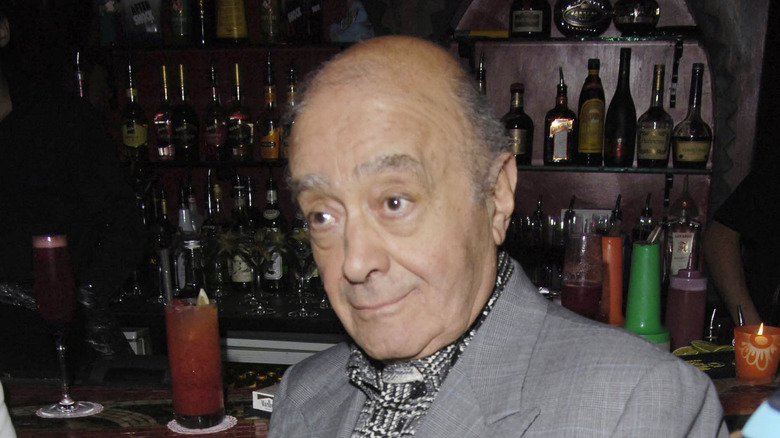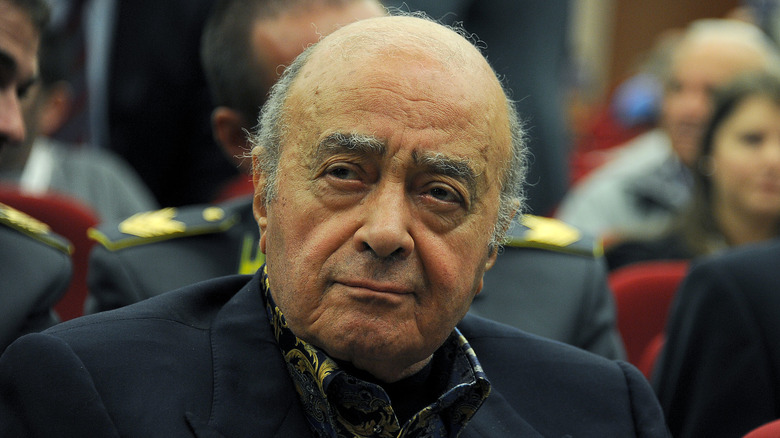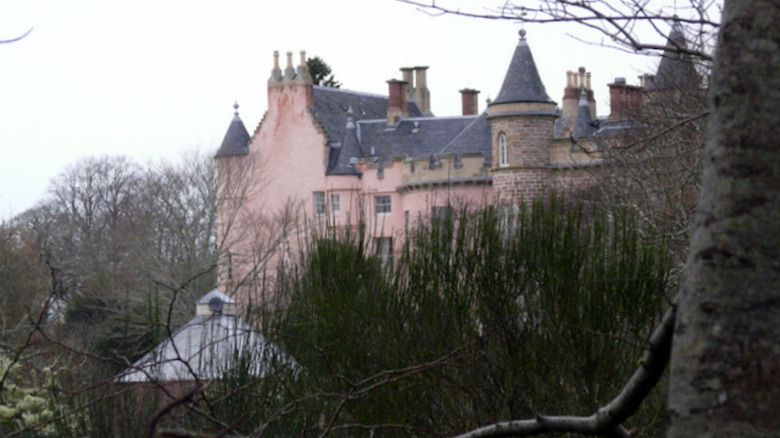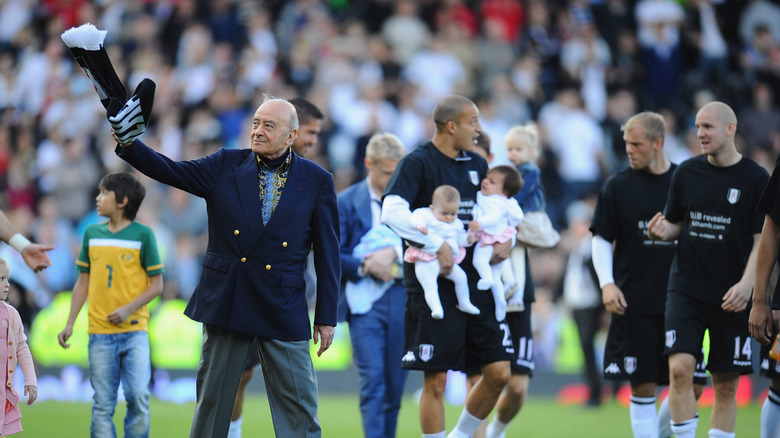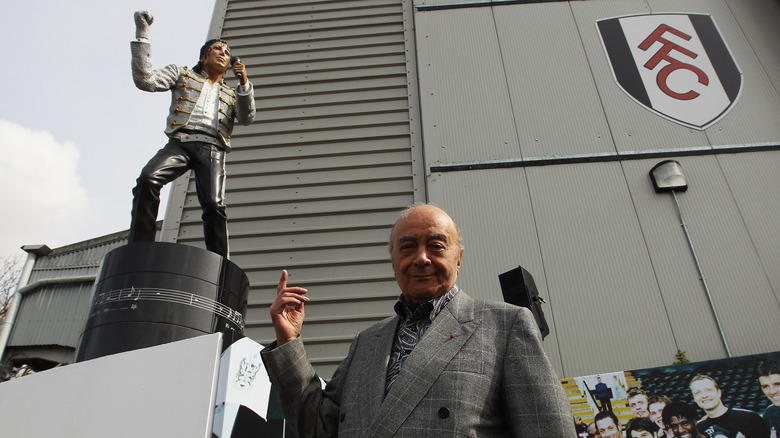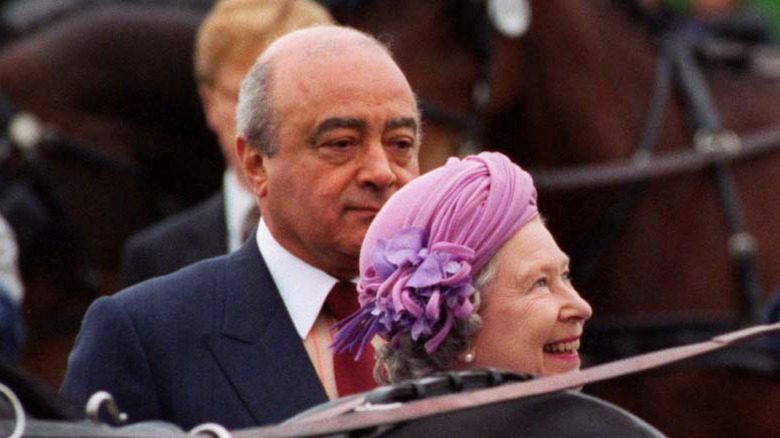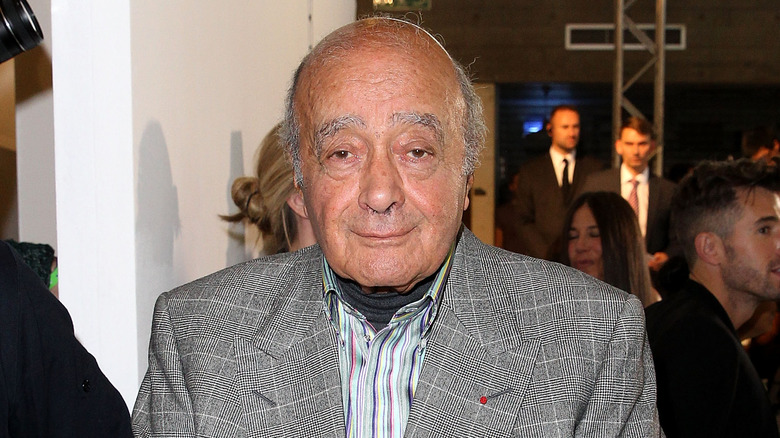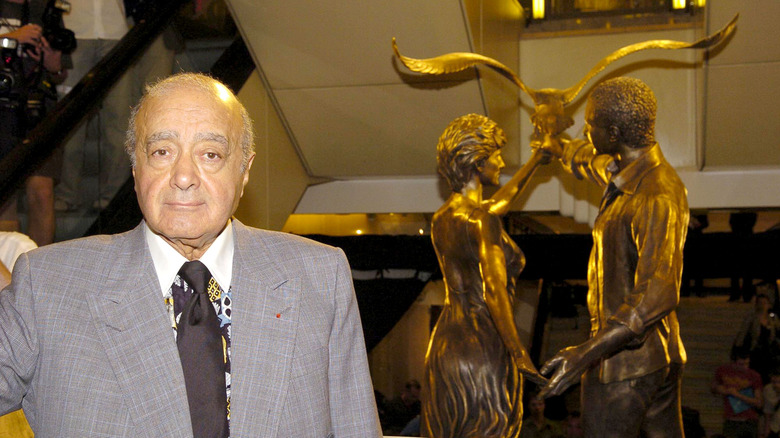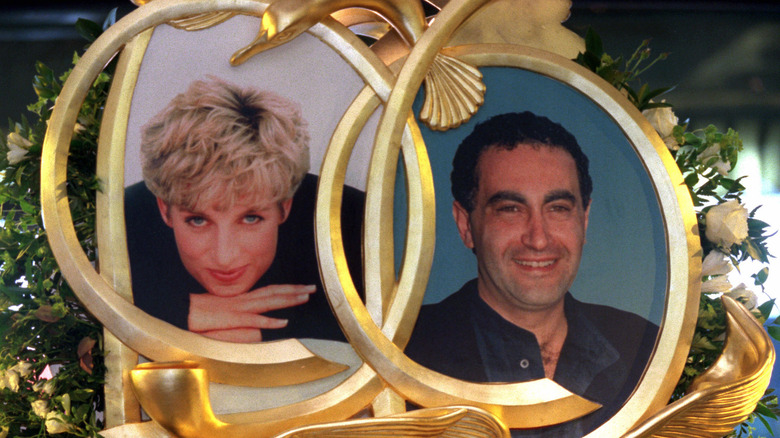Who Was Dodi Fayed's Father?
The following article mentions sexual misconduct allegations.
In 1997, Princess Diana and her boyfriend, Dodi Fayed, died in a tragic car accident in Paris' Pont de l'Alma tunnel. At the time, Fayed was generally regarded as a jet-setting international playboy with an ever-changing parade of beautiful women on his arm. Beyond that, he was best known for his work as a movie producer, on films including "The Scarlet Letter" and the Oscar-winning "Chariots of Fire."
Viewers of Netflix drama "The Crown" were introduced to Fayed in the series' 5th season, which also delved into the backstory of his father, vastly wealthy business tycoon Mohamed Al-Fayed. Born in 1929 in Alexandria, Egypt, Al-Fayed eventually made London his home, where his brash style clashed with the stodgy British establishment.
Having celebrated his 94th birthday in 2023, Al-Fayed remains a controversial figure in the UK, generating numerous headlines throughout his lifetime. With the sixth and final season of "The Crown" scheduled to air in the fall of 2023, Al-Fayed's name is pretty much guaranteed to be resurrected as the series continues to revive interest in the circumstances behind Diana's death — and Al-Fayed's connection to it all. Read on to learn all about Dodi Fayed's father.
He made his fortune working with his brother-in-law, an infamous arms dealer
By some accounts, Mohamed Al-Fayed (an alteration of his surname at birth, Fayed) wasn't born rich; his father was reportedly a schoolteacher of modest means. The young Al-Fayed, however, displayed an entrepreneurial spirit and a gift for salesmanship from an early age. As a kid, he made money selling soda out of a wheelbarrow before taking on other sales gigs. Al-Fayed, however, spun a different tale, of being born into a prosperous family with generational wealth, raised by British nannies.
In 1954, Al-Fayed married Samira Khashoggi, sister of Saudi billionaire Adnan Khashoggi, who made his fortune as one of the world's most infamous arms dealers. That family connection proved beneficial for Al-Fayed, who went to work for his brother-in-law at his import-export firm. That business led Al-Fayed to relocate to Genoa, Italy, in the late 1950s. In 1964, he settled in London. It was during this period that he changed his surname from Fayed to Al-Fayed, and began advising the sultan of Brunei. He eventually struck out on his own by launching a shipping company, Genevaco, followed by Dubai-based International Marine Services.
As of 2023, Al-Fayed was worth an estimated $2 billion. "But it does not affect me," he said of his enormous wealth in a 2004 interview with CNN, "you can take everything from me today and I can sit in Hyde Park and have a sandwich and I am healthy and happy."
He purchased the Ritz hotel in Paris
By 1979, Mohamed Al-Fayed was well-established in his adopted home of London. That year, in partnership with his brothers, he plunked down $20 million for the Ritz hotel in Paris. Established in 1898 by Swiss hotel magnate César Ritz, the hotel had long been the No. 1 choice of hotel in the City of Lights for the world's famous, wealthy, and elite. "When I bought the Ritz, I had in mind to refurbish the hotel in César Ritz's image — to do things here that would excite me and at the same time make Monsieur Ritz proud of his place if he were to see it today," Fayed told Vanity Fair. "It took us years, but I'm sure we brought a smile to Monsieur Ritz's face. It was a joyful experience."
Joyful, perhaps, but also expensive. Restoring the legendary hotel to its former glory reportedly cost $50 million, thanks to Al-Fayed's meticulous attention to detail throughout the process. "The rooms were all restored to their old elegance, the bars completely refurbished," the hotel's managing director, Frank Klein, told Vanity Fair, noting that renovations extended to the restaurants, along with the additions of a swimming pool, fitness center, and spa facility in the hotel basement. "The Ritz once again became the Ritz," Klein added.
In 2019, Al-Fayed — 90 at the time — stepped down as the hotel's chairman; as of 2023, he remained the hotel's owner.
He owned and then sold London's most iconic department store
In 1985, Mohamed Al-Fayed acquired his most celebrated asset when he and his brothers purchased controlling interest in the House of Fraser, a group that included more than 100 department stores in Great Britain. That included the jewel in the crown, Harrods, the iconic retail behemoth in London's post Knightsbridge district. The cost: $842 million.
The deal, however, placed him into a pitched battle with one of the UK's most powerful business tycoons: Roland "Tiny" Rowland (his ironic nickname came from his imposing stature), CEO of Lonrho group. Rowland, a notorious corporate raider, also had an eye on taking over the House of Fraser, and was enraged when Al-Fayed beat him to it. As The Washington Post reported at the time, Rowland struck back with what had been dubbed "Operation Sphinx." In 1989, a newspaper he owned, the Observer, published a special edition containing a confidential government inquiry into Al-Fayed's acquisition that he'd illicitly acquired.
In 2010, Al-Fayed sold Harrods to Qatar Holdings, owned by the royal family of Qatar, for a reported $1.9 billion. While a statement accompanying the news claimed that he sold in order to spend more time with his family, Al-Fayed revealed the truth in a subsequent interview with the Evening Standard. Al-Fayed alleged that government pension trustees were putting up roadblocks preventing his ability to extract dividends. He also offered some final thoughts on rival Rowland, who died in 1998. "Thanks God!" he declared. "He's gone away!"
He was the central figure in a British political scandal
In 1994, Mohamed Al-Fayed made a shocking allegation, claiming that a lobbying firm had paid cash bribes to certain politicians so that they'd ask questions on behalf of Harrods during parliamentary sessions. According to Al-Fayed, he had no choice, claiming that the company's owner, Ian Greer, approached him and promised he could help counteract the damaging questions being asked by politicians aligned with his rival, "Tiny" Rowland. "Mr. Greer said to me: 'You need to rent an MP just like you rent a London taxi,'" Al-Fayed told The Guardian. "I couldn't believe that in Britain, where Parliament has such a big reputation, you had to pay MPs. I was shattered by it. I asked how much and he said it would be £2,000 a question." Greer denied the allegations.
Dubbed the "cash-for-questions scandal" by the British media, the investigation sparked by Al-Fayed's accusations had wide-reaching repercussions. Conservative MPs Neil Hamilton and Tim Smith were forced to resign. According to BBC News, Hamilton and Greer both launched a libel suit against The Guardian, but eventually dropped it. The scandal also ensnared former defence minister Jonathan Aitken. As per The Guardian, Aitken was sent to jail on a perjury conviction for lying in court about the Saudi royal family covering his expenses when he stayed at Al-Fayed's Ritz in Paris.
Al-Fayed's revelations ultimately resulted in the creation of the British government's Seven Principles of Public Life, a code of moral and legal conduct by which elected officials must abide.
He was arrested over accusations involving a safety deposit box
Mohamed Al-Fayed's feud with "Tiny" Rowland took a bizarre twist when the former was arrested in 1998. Per the Independent, a safety deposit box Rowland kept at Harrods had apparently been looted of tape recordings, documents, and gems. Al-Fayed was alleged to be at the center of it. The allegations were made by politician Neil Hamilton, in the midst of the cash-for-questions scandal. Hamilton claimed that when Al-Fayed learned that his arch-rival had a Harrods safety deposit box, he paid a locksmith to bust in so he could find out what it contained. Al-Fayed admitted the box had been opened, but denied having anything to do with it.
Scotland Yard decided not to press charges, with prosecutors determining there was no way they'd secure a conviction. "The collapse of criminal proceedings against us is a triumph for the truth," said Al-Fayed in a statement obtained by BBC News. Per The Guardian, Al-Fayed subsequently sued the Metropolitan police, alleging wrongful arrest and false imprisonment (he lost). In 2000, he settled with Rowland's widow over the supposedly missing jewels, paying more than $4.4 million.
According to The Guardian, another British politician later alleged that the entire matter was a "vicious little scam" designed to humiliate Al-Fayed. According to Tory MP Charles Wardle, the scheme was "engineered" by Rowland, involving bribes, corrupt cops, and a vendetta against Al-Fayed by members of the British Security Service in retaliation for his accusations about the deaths of his son and Princess Diana.
He bought a Scottish castle and rented a royal residence
Over the decades, Mohamed Al-Fayed was often described — often in a denigrating manner — as a collector of fabulous trophies, including such prestige investments as Harrods and the Ritz. Al-Fayed, however, preferred to see himself as a businessman with a gift for buying and selling the right assets at the right time. When it came to acquiring those assets, however, he did have a knack for picking up flashy properties with deep historical significance. Such was the case back in 1972 when he bought a Scottish castle with a history dating back to the 14th century. When Al-Fayed purchased Balnagown Castle and its grounds, the place was decrepit. After investing more than $20 million in renovations, the castle was returned to its stately splendor.
More than 30 years later, using the profits from some shrewd London real estate deals, he launched a massive development project on the castle's grounds, building expensive homes in the Scottish Highlands for well-heeled investors.
After Wallis Simpson, Duchess of Windsor, died in 1986, Al-Fayed was approached by future French president Jacques Chirac (who was the mayor of Paris at the time). Chirac encouraged him to pick up the lease of the palatial home that Simpson shared with her husband, the former British king whose abdication ultimately led to the coronation of Queen Elizabeth II. Al-Fayed took it one step further and eventually purchased the home, ultimately spending $14.4 million to remodel the place.
He owned a British soccer team
Another trophy owned by Mohamed Al-Fayed was his own soccer team, the Fulham Football Club. Al-Fayed purchased the team in 1997 for almost $8 million, and spared no expense in working to fulfill his goal that the West London team would eventually make it to the Premier League. "They would be backed by a checkbook spending spree unprecedented in Fulham's history," noted the team's website, in reference to Al-Fayed's financial support in attempting to turn the team's fortunes around. All told, Al-Fayed reportedly injected more than $200 million into the team, in the form of interest-free loans. He also embraced some unorthodox training techniques; according to the Daily Star, he was said to have handed out Viagra to players before a game, in the apparent belief that it would enhance their skills on the field.
In 2013, Al-Fayed wound up selling the team to billionaire Shahid Khan, owner of NFL team the Jacksonville Jaguars. Khan reportedly paid somewhere in the range of $190-$250 million.
"The time is right because I have found a very good man in Shahid Khan to accept the responsibility and privilege that I have enjoyed at Fulham since 1997," said Al-Fayed in a statement at the time of the sale, reported BBC News. "I am now delighted to be passing this great and historic club into the care and stewardship of an outstanding man who has already achieved much in his life and will, I am sure, take Fulham on to even greater things."
He stirred up controversy with a statue honoring Michael Jackson
During the decade-plus that Mohamed Al-Fayed owned the Fulham Football Club, he enjoyed bringing his famous friends into the locker room to meet the players. "He would walk in after the game with a celebrity — one time it was Tony Curtis," former Fulham manager Chris Coleman told Daily Star, referring to the star of such films as "Some Like It Hot" and "The Sweet Smell of Success."
Another celebrity who made an impact on the team was Michael Jackson — whose posthumous presence was felt on the club in the form of a ginormous statue of the late King of Pop that was erected in 2011, outside the club's stadium, Craven Cottage. According to BBC News, Al-Fayed had been a close friend of Jackson's, and commissioned the 7-foot-6-inch statue as a tribute that he initially intended to place on display in Harrods. During the period between commissioning the statue and its delivery, Al-Fayed sold Harrods, leading him to place the statue outside Fulham's stadium instead.
The statue was far from beloved by Fulham, and was besieged with mockery. When the team was sold in 2013, new owner Shahid Khan sided with fans, ordering the statue be dismantled and removed; it was subsequently placed on display in the National Football Museum in Manchester. In 2019, the statue was taken out of the museum due to controversy over sexual abuse claims made in the HBO documentary "Finding Neverland."
He had a complicated relationship with the royal family
When Mohamed Al-Fayed took over ownership of Harrods, he also wound up stepping into a long relationship with Britain's royal family, who had a long pre-existing love affair with the store. In fact, Queen Elizabeth II and other royals reportedly loved to shop there, with Princess Margaret once visiting in person to pick out Christmas gifts.
Prior to Al-Fayed taking over as owner, Harrods had served as sponsor of the Royal Windsor Horse Show, beginning in 1984. As owner, Al-Fayed was happy to maintain that tradition, particularly because it gave him an excuse to rub shoulders with royalty.
This occasionally led to some odd circumstances. As a former royal aide told The Times, Al-Fayed was mingling with Prince Philip during the 1993 edition of the event when the queen's husband complained about his arthritis. Al-Fayed reportedly then opened his own shirt and showed the royal that it was fastened with Velcro instead of buttons, noting that it was designed for people with arthritis and the like. "Everybody knew what his game was," the aide said of Al-Fayed's attention-grabbing shenanigans. "He was a bit of a fish out of water but, as long as you dealt with him with a long spoon and your eyes wide open, he was no more of a rogue than a lot of other people who were hanging around London at the time."
He was hit with allegations of sexual misconduct
Over the years, Mohamed Al-Fayed has faced numerous accusations of sexual harassment. In 1997, an investigative TV news report detailed allegations of several women who worked at Harrods. "He would get a bit gropey," one accuser — who also accused Al-Fayed of bugging her phone — told The Independent. In 1999, he was accused by a flight attendant on a private jet of making unwanted advances. In October 2008, he was questioned by police, who were investigating an allegation — which had been made that May — that he'd sexually assaulted a 15-year-old girl within Harrods. Al-Fayed proclaimed his innocence. "Mr. Al-Fayed vehemently denies this allegation and is confident that his name will be cleared," his spokesperson said in a statement to Reuters.
In February 2009, the Crown Prosecution Service announced that he wouldn't be prosecuted after determining they had no chance of convicting him. "I have to ask why it took so long and why it was handled in such a way as to cause me and my businesses the maximum degree of damage," he said, as reported by BBC News. "I am shocked that the system can be manipulated in such a way."
Nearly a decade later, a 2017 TV special broadcast sexual harassment accusations made by several women, including one who claimed he promised her acting work in exchange for sleeping with him when she was just 17. Al-Fayed denied these allegations as well.
He long alleged the deaths of his son and Princess Diana were a royal assassination
Mohamed Al-Fayed's relationship with the royals grew significantly more complicated after the death of son Dodi Fayed and Princess Diana, who had been dating at the time of the car crash that claimed their lives. Al-Fayed believed the crash was no accident, and made his views known very publicly. According to Al-Fayed, their deaths were the result of a vast conspiracy that had been engineered by Prince Philip, involving British intelligence service MI6, Prime Minister Tony Blair, the CIA, and Sir Michael Jay, who at the time was Britain's ambassador to France.
Testifying during the 2008 inquest into the crash, Al-Fayed claimed Dodi and Diana were about to announce their engagement, and alleged that Prince Philip ordered their assassinations on the grounds that the royals would never abide the Princess of Wales marrying a Muslim. "Diana suffered for 20 years from this Dracula family," Al-Fayed said, via CNN. He also had some choice words to share about Prince Philip, calling the Greek royal a "Nazi" and a "racist." As BBC News reported, Al-Fayed declared, "It's time to send him back to Germany from where he comes ... You want to know his original name — it ends with Frankenstein." All of Al-Fayed's claims were dismissed due to lack of evidence.
A bronze statue of Dodi and Diana went on display at Harrods in 2005; it was removed in 2018.
He claimed Diana was pregnant when she died
During his testimony at the inquest into the deaths of son Dodi Fayed and Princess Diana, Mohamed Al-Fayed also made the shocking claim that Diana had been pregnant with his son's child at the time of her death. In fact, Al-Fayed had been publicly making that claim for years.
Those widely reported claims of Diana's pregnancy, however, fell apart under scrutiny. Diana's blood had been tested, and demonstrated no trace of the distinctive hormone that would have been detected had she been pregnant. In addition, witnesses aboard the yacht — upon which the couple were said to have conceived — squashed Al-Fayed's claim, with one testifying Diana had been on her period at the time. Adding even further evidence was Dr. John Burton, the former coroner of the queen's household, who testified that he'd personally examined Diana's reproductive organs, and was able to easily determine that she wasn't pregnant. Meanwhile, coroner Sir Justice John Baker wondered why Al-Fayed hadn't spoken out about the alleged pregnancy until 2001 — years after the crash. "If it is true, it is strange that he sat upon this important information for three-and-a-half years," Baker said, via The Guardian.
Al-Fayed, of course, had an answer that explained everything: everyone who'd testified was also part of the conspiracy. "All the witnesses who have been saying this are part of the cover-up and have been told what to say," he insisted, as reported by BBC News.
If you or anyone you know has been a victim of sexual assault, help is available. Visit the Rape, Abuse & Incest National Network website or contact RAINN's National Helpline at 1-800-656-HOPE (4673).
